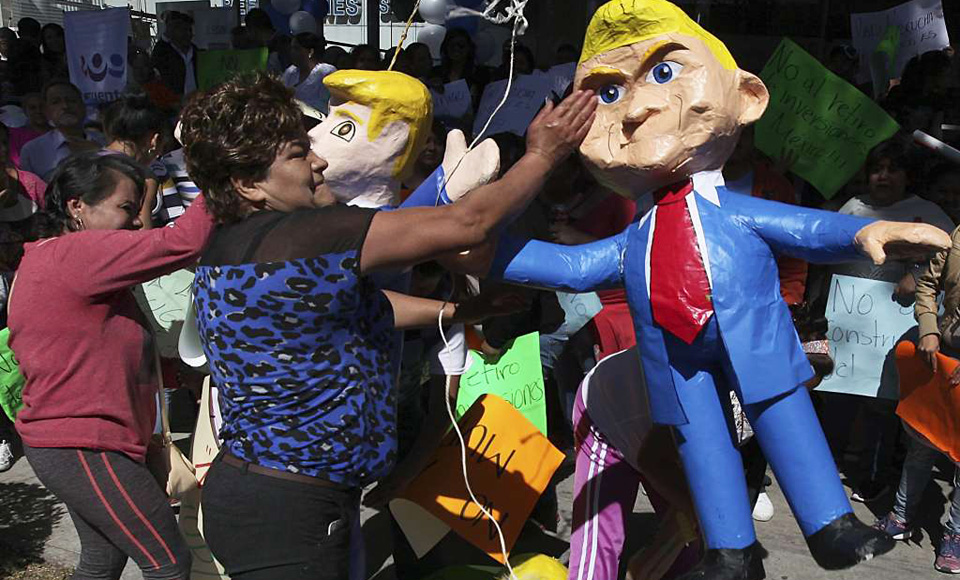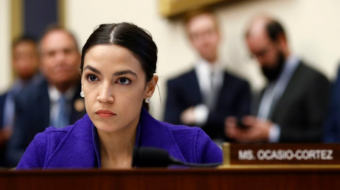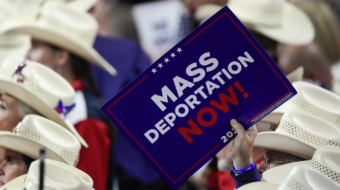
This past week, the Trump administration sent Secretary of State Rex Tillerson and Secretary of Homeland Security General John Kelly to Mexico City to either smooth ruffled feathers there, or perhaps to lay down the law to the Mexican government.
Against all evidence, Trump claims that the North American Free Trade Agreement (NAFTA) has led to Mexico taking unfair advantage of the United States. In fact, the majority of Mexican workers and small farmers have been major losers under NAFTA, as have been workers in the United States who have lost industrial jobs as a result of these and other neo-liberal trade deals. Meanwhile, the corporate elites in all three countries have been the big beneficiaries.
Trump has said many times that he will demand that Mexico agree to modifications more favorable to U.S. interests or he will tear up the treaty. To back up his demands, Trump has been threatening to impose import tariffs of up to 35 percent on cars produced in Mexico.
In his latest slap against Mexico, Trump demanded that it take charge of anyone the U.S. deports who had crossed the U.S. border from Mexico without papers regardless of their country of citizenship. This would be a violation of Mexico’s sovereignty; no country is obliged to accept deported people who are not its own citizens.
Plan could do real damage
If Trump is not bluffing, he could do real damage to our neighbor to the south. Mexicans living outside the country’s borders, mostly in the United States, send around $27 billion in remittances back to Mexico every year, more than what Mexico currently brings in from its main export, petroleum. If a large number of Mexican immigrants living in the United States were deported, not only would a big chunk of that sum disappear, but the hard-pressed Mexican economy would have to absorb millions of destitute deportees, driving down wages and putting the already rickety social safety net under unsustainable pressure. Further, if the U.S. will not buy products of Mexican industry or slaps killing tariffs on them, manufacturing jobs will disappear also.
Mexico left dependent on U.S. for food
When NAFTA was being negotiated, the left and many farmers’ organizations in Mexico vociferously opposed it as a neoliberal horror that would wreck the lives of millions. This prediction came true. But now, due to the way NAFTA has distorted the Mexican economy over its 23 year history, suddenly abrogating the pact, or forcing Mexico to renegotiate it so as to make it even more favorable to U.S. corporations, could actually severely worsen the situation for Mexican workers and small farmers.
Much of the farmland and food distribution networks that used to provide a living for millions have been privatized under NAFTA; as a result, Mexico has become dependent on food imports from U.S. agribusiness. NAFTA was deliberately structured so as to drive small-scale grain farmers out of business; the displaced rural population would supposedly find jobs in manufacturing operations set up by multinational corporations, including U.S.-based ones, that would be attracted to Mexico by the low-paid workforce.
The goal of NAFTA, according to former Mexican President Carlos Salinas de Gortari, was to turn Mexico into a “First World” country. Corporations did move production to Mexico from the United States and other wealthy industrialized countries. But they would only stay in Mexico if wages were kept low there. So this was an utter failure as a strategy to overcome poverty; the low-wage model could not create enough economic activity in Mexico to pull it out of poverty.
NAFTA increased Mexican emigration to the United States. Because the U.S. does not give permanent resident visas to displaced Mexican farmers, the migrants come in the only way they can, as undocumented workers.
Mexicans criticize their own government
The anger of the Mexican people toward Trump is incandescent. But feelings have also been running high against Mexico’s own government. Mexicans point out that, if anything, the last several governments in Mexico have been bowed to the United States to the point of servility. For example, in recent years Mexico has cooperated with United States to keep people from Central America from crossing its territory to get to the United States, leading to many abuses of the rights of Guatemalan, Honduran and Salvadoran migrants.
Mexican citizens have sharply criticized their government for doing Washington’s dirty work, but the Trump administration is not disposed to show any gratitude. As the possibility grew last year that Trump might be elected president of the United States, Mexican President Enrique Peña Nieto (Revolutionary Institutional Party, PRI) invited him to speak at a joint appearance in Mexico City. The arrangement was set up between then-Mexican Finance Minister Luis Videgaray and Jared Kushner, Trump’s son-in-law; no such invitation was extended to Hillary Clinton. When Trump immediately returned to the theme of forcing Mexico to “build the wall”, Peña Nieto was accused of allowing his country to be humiliated once again, and Videgaray resigned from the finance portfolio. But now Videgaray is the foreign minister.
Videgaray and Interior Minister Miguel Angel Osorio Chong made a show of indignant national pride in response to the idea that Mexico should accept deportees who are not Mexican citizens, and to the Trump administration’s idea that aid money sent to Mexico to bolster its security system might be seized to pay for “the wall.” No way would Mexico take responsibility for deportees that are not its own citizens, said Videgaray. Osorio Chong chimed in: The money the U.S Congress had appropriated through the “Merida Initiative” to help Mexico bolster its internal security, about $2.5 billion, is almost used up anyway, he pointed out.
Many in Mexico still do not trust the Peña Nieto government to stand up to Trump and defend the country’s national interests. A demonstration organized in Mexico City on Feb. 12, led by people seen as being close to the government, did not attract mass support. In recent polls, Peña Nieto’s approval rate has been as low as 12 percent. There is anger at the government because of drastic hikes in gasoline prices, a faltering economy and a chronic personal security problem epitomized by the fact that the September 2014 disappearance of 43 teacher trainees from the Raul Isidro Burgos Normal School at Ayotzinapa in the state of Guerrero has still not been solved.
A deal over Mexico’s oil resources in the works?
There is ongoing controversy about the creeping privatization schemes of Mexico’s national oil company PEMEX. Multinational oil monopolies, represented in the Trump administration by Secretary of State Tillerson, have been salivating over the prospects.
What is Mexico to do? Knuckling under to Trump’s demands is unacceptable, but how to resist? One interesting idea has been put forward, namely for Mexico to stop buying grain from U.S. agribusiness, and instead buy or at least threaten to buy it from other countries. This would reduce Mexico’s dependence on trade with the United States, while also pressuring U.S. agribusiness which might then put pressure on Trump to lay off the rough stuff. Argentina and Brazil have been mentioned as alternative sources of grain for Mexico. This cannot be done overnight, however.
There is a presidential election in Mexico in 2018, in which the response to Trump’s threats will be a major theme. All opposition parties, including the right-wing National Action Party (PAN) and the left wing Movement for National Renovation, or Morena, are going to be attacking the current government on this and other issues. Under Mexico’s term limits, Peña Nieto cannot run for reelection, so there will be strife within the PRI also. Polls suggest that Morena’s probable candidate, leftist former Mexico City Mayor Andres Manuel López Obrador, has a chance of winning.












Comments